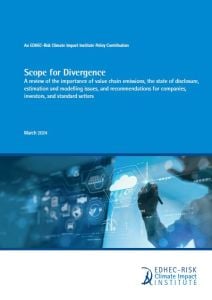

Scope for Divergence - A review of the importance of value chain emissions, the state of disclosure, estimation and modelling issues, and recommendations for companies, investors, and standard setters
This policy report offers comprehensive insights into accounting for greenhouse gas emissions throughout companies’ value chains, and the challenges this proces ...
Author(s):
Summary:
This policy report offers comprehensive insights into accounting for greenhouse gas emissions throughout companies’ value chains, and the challenges this process poses to companies and investors. Regulators are caught up in the contentious debate between investors and environmental NGOs who favour disclosure and business organisations and politicians representing fossil fuel interests who oppose it.
The European Union requires the construction of its climate benchmarks to be steered by value chain emissions and has mandated corporate reporting of these emissions when material; across the Atlantic, opponents of disclosures argue that accounting is unfeasible or too costly for corporates and that it will produce inaccurate estimates with limited practical value or significance, notably for investors. Yet somehow, the EU’s requirements are being met, and without any of opponents’ doom mongering coming to fruition, suggesting that their claims are largely mythical in nature.
As a significant majority of the global population supports action against climate change, investors are intent on better understanding the climate change impact and risks of investee companies. Direct and purchased energy emissions (Scope 1 and 2) have historically been the focus of reporting standards. However, the report finds that the indirect emissions that occur throughout companies’ value chains (Scope 3) typically account for the bulk of their carbon footprints.
Key findings:
- Value chain emissions represent a material source of emissions that companies can strategically manage in order to address both their impact on climate change and their exposure to transition risks.
- Quantitative progress in voluntary reporting of value chain emissions has not been accompanied by an improvement in the quality of the data provided. Reporting is too often an exercise in greenwashing and remains sparse, incomplete, and insufficiently focused on material sources.
- Opposing mandatory reporting based on these limitations confuses the symptom for the cause. Mandatory reporting and assurance will materially improve the availability and reliability of reported data.
- However current reporting standards are not intended to support cross-corporate comparisons and reported data will remain irrelevant to certain usages sought by investors.
- Scope 3 emissions modelled by data providers may address issues of completeness and comparability but come with challenges of model stability and insufficient consideration of corporate specificities, drawbacks which also limit potential investor usages.
Register to download PDF
Register/Log in| Type : | EDHEC Publication |
|---|---|
| Date : | 29/03/2024 |

